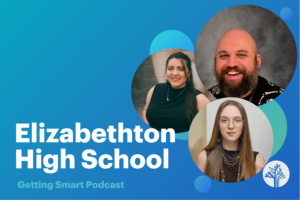60 Day Whirlwind Reveals New Schools & Tools

The future of education is being built, bit by bit, all over this country. New tools and new schools are being developed at a dizzying pace. Here’s a few things we’ve seen in the last 60 days. And, to borrow a phrase from my friends at 4.0 Schools, I’ve tried to capture their “Future of School Hypothesis.”
- 4.0 Schools incubates people, tools, and schools. They run Startup Weekend Education and a three day Essentials program where prospective edupreneurs test out their ideas. Since 2010, 4.0 has helped launch 40 ventures. Last week I visited the recently opened 4.0 NYC campus and visited with six diverse new ventures. CEO Matt Candler is a leading thinker on new school development advancing the concept of tiny schools, small scale new models that allow rapid iteration.
- 4.0 Future of School Hypothesis: develop leaders that rethink school
- LEAP Innovation helps Chicago educators create personalized learning environments and host short cycle EdTech trials. LEAP is headquartered at 1871, the nation’s largest university affiliated startups incubator.
- LEAP Future of School Hypothesis: connect education and innovation
- Impact Engine is a Chicago accelerator also located at 1871. With the support of an angel network, Impact Engine invest in and support impact focused startups. Some of their education startups including ThinkCERCA, Edovo, and Learnmetrics.
- Impact LEAP Future of School Hypothesis: empowers entrepreneurs, mentors, and investors to make a positive impact on society. [See below for discussion of incubators and accelerators]
- NGLC and the National Center for Innovation in Education at the University of Kentucky and announced a new program of work called the Assessment for Learning Project. About 15 grants will be made in January focusing on measuring the right stuff, enhancing teaching and learning, and engaging educators (applications are due 12/11). A great advisory board met last week at 1871–a great place to discuss innovation.
- AfL Future of School Hypothesis: assessment should inform learning, measure the right stuff, and engage educators
- The International Association for K-12 Online Learning (iNACOL) held their annual Blended & Online Learning Symposium last week. More than 3000 leading educators (see 50 examples) shared developments in tools and schools (see photos).
- iNACOL Future of School Hypothesis: ensure all students have access to a world-class education and quality blended and online learning opportunities
- Brooklyn Lab is new blended middle school that, like Summit Public Schools, is an example of a team simultaneously developing a next gen environment and platform (see 2014 trip report). Built on the Ed-Fi data standard with support from the Dell Foundation, the Cortex platform is highly configurable and is already being piloted at an Achievement First greenfield site. With another middle school and a new high school Brooklyn Lab plans to serve 2200 mostly low income minority Brooklyn students by 2020. There’s a good chance that a lot more students will be learning on the Cortex platform.
- Brooklyn Lab Future of School Hypothesis: innovate to create experiences that combine joy and rigor and prepare young people for college and careers
- Denver Public Schools has an aggressive elected board pushing innovation across a decentralized diverse portfolio of schools. It may be the only district with its own new school incubator, the Imaginarium, which provides small grants and design services to schools. We visiting an amazing transformation, Grant-Beacon Middle School featuring character development, and blended and extended learning. We loved Roots Elementary, a next-gen primary where Montessori meets #iPadEd, and Rocky Mountain Prep.
- DPS Future of School Hypothesis: diverse portfolio of district and charter schools
- New Orleans is served by 88 charter schools operated by 45 nonprofits. Next-gen schools include KIPP Central City, Renew Schools, and Bricolage Academy. I remember being there 10 years ago right after the storm; it was great to see how much progress has been made.
- NOLA Future of School Hypothesis: diverse portfolio of charter schools
- Atlanta hosted the Georgia EdTech Conference, an exciting event that showcased local innovators including Fulton County Schools (see how they are customizing personalized learning implementation).
- Fulton Future of School Hypothesis: decentralize and support school transformation
- Hewlett Foundation convened its Deeper Learning grantees in San Diego last month. They include networks of schools and project-based learning advocates united by the goal of engaging students in meaningful work.
- Hewlett Future of School Hypothesis: engage students so they use their knowledge and skills in a way that prepares them for economic success and civic participation
- Educause, the HigherEd EdTech group, held their annual conference in Indianapolis. They talked about machine learning, infrastructure for digital learning, and innovative programs. Andy Calkins, NGLC, and I make the case that all of the next generation K-12 schools has 10 Implications for HigherEd.
- NGLC Future of School Hypothesis: accelerate educational innovation through applied technology to dramatically improve college readiness and completion
- At the Excelined National Summit on Education Reform in Denver there was a great lineup of speakers suggesting lots of progress in policy and practice.
- ExcelinEd Future of School Hypothesis: state policy and digital learning are big levers to improve student preparation for success in the 21st century
That’s a short anecdotal list (from 60 whirlwind days of travel) but it has been impressive to see and hear about so much progress.
Background on Incubators & Accelerators
There are three kinds of entrepreneurial support organizations that have been active in the entrepreneurial space that are becoming more common in the learning sector:
- Co-working space : Companies pay to be there; some becoming more resource heavy; some offer learning experiences
- Global General Assembly and 1776 in DC
- Incubators: Offering more resources that co-working space, incubators are are often run by nonprofits focused on a sector or a city; companies usually get in free but may pay rent and service fees
- New Orleans’s 4.0 Schools
- Accelerators : Companies are selected based on potential; they are resident for a defined period of time and typically participate as a cohort; they receive some funding and services in return for an equity stake (usually between 5-10%).
- Boston’s LearnLaunch, Chicago’s Impact Engine, Silicon Valley’s ImagineK12
For more, check out:







0 Comments
Leave a Comment
Your email address will not be published. All fields are required.